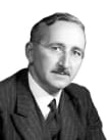Henry Hazlitt (1894-1993)
In essence, Hazlitt was not only known for his razor-sharp criticism of the teachings of John Maynard Keynes and for his contributions to monetary and fiscal theory. He was also instrumental in popularizing Austrian Economics in the United States.
It is 2023, and lest we forget an important writer and scholar, we should recall in a few words the life and work of Henry Hazlitt who died 30 years ago, on July 9, 1993. Hazlitt belonged to that long gone generation of American erudite journalists, essayists and social scientists whose extensive work arose from a comprehensive view of interdependent disciplines.
Hazlitt was born in Philadelphia on November 28, 1894 and attended a private school for impoverished, half-orphan children. After moving to Brooklyn (New York), he had to start very young earning money with odd jobs to support his widowed mother. Eager to learn but unable to afford any regular higher education, he spent most of his scarce free time in the libraries of New York, where he accidentally came across Philip Wicksteed’s book The Common Sense of Political Economy, Including a Study of the Human Basis of Economic Law (London, 1910). This textbook, widely used in the UK was his first formative influence in the subject of economic thinking and led him to further systematic readings and self-education. With no formal training, Hazlitt essentially acquired his skills on the job and through constant reading, but always attributed his later success to the luck of having read important books and having met educated people. At just under 17 he found a minor job as a secretary to the managing editor of the newly founded Wall Street Journal. However, at the age of 21 Hazlitt published his first book, Thinking as a Science (New York, 1916).
During WW I Hazlitt enlisted and was transferred to Texas to serve in an Aviation Section of the U.S. Army Air Service, the forerunner of the U.S. Airforce. Back in New York, in November 1918 he began working as a financial editor and sometimes as an editorial writer for various newspapers, among them the New York Evening Mail and the New York Sun. Later he joined the more prestigious New York Times (then still a leading conservative newspaper).
In 1938, still with the New York Times, Hazlitt reviewed the English translation of Ludwig von Mises’ seminal book Die Gemeinwirtschaft (1922). Full of praise, he described the book as “the most devastating analysis of socialism ever written. This translation, with the title Socialism had an enormous political impact and made even America’s most prominent and active Communist intellectuals of the period, J.B. Matthews to thoroughly revise his views.
It should be mentioned here, that neither in the United States nor in his native Austria, von Mises could easily find a paid position in academia. It is therefore largely the result and merit of Henry Hazlitt’s tireless efforts that Mises and his wife were able to survive in New York after their hurried flight from the Nazis. In addition to several paid editorials for the NYT, Hazlitt also secured a grant from the Rockefeller Foundation that enabled Mises to write his two important books, Omnipotent Government (1944) and Bureaucracy (1944). Hazlitt’s friend Leonard Read (founder of FEE) soon hired Mises as an economic consultant, and together helped von Mises finding even a position as a tolerated visiting professor at the New York University Graduate School of Business Administration in 1945. Then, during the 1950s, Mises taught graduate classes at NYU, however he never was offered a permanent position.
When F.A. von Hayek’s The Road to Serfdom appeared in London in 1944, Hazlitt reviewed it for the New York Times (NYT), calling it “one of the most important books of our generation” and thus was to a degree instrumental that The Road to
Serfdom became a bestseller in the US during the first years following WWII. At Hayek’s invitation, Hazlitt attended the founding conference of the Mont Pelerin Society in Switzerland in April 1947.
When the Allies organized the Bretton Woods Conference in 1944 in New Hampshire, Hazlitt’s wrote several pointed editorials against the dominant teachings of John Maynard Keynes. He opposed and scourged especially the proposed establishment of an International Monetary Fund (IMF) and a World Bank as inflationary and incompatible with the ideal of free markets. However, after 43 nations enthusiastically embraced the idea and the NYT became increasingly hostile to Hazlitt’s viewpoints, he resigned and switched to Newsweek.
For about twenty years from 1946-1966, week after week Hazlitt analyzed world affairs and government programs from the perspective of the Austrian School in his Business Tides columns for Newsweek. Due to his clear and emphatic style, his
column gained a wide and influential readership. L. von Mises once referred to Hazlitt’s columns, that they kept the Federal Reserve (FED) from expanding their credit manipulation as much as they would have liked. In 1966, Hazlitt lost his position at Newsweek when the weekly was taken over by the more left-leaning Washington Post. He was replaced by three alternative writing professors: Milton Friedman (University of Chicago), Henry Wallich (Yale), and Paul A. Samuelson of M.I.T.
By all accounts, Henry Hazlitt was one of the most prolific advocates of the of the Austrian School’s 5th generation, authoring some 25 books and well over 15,000 news articles, influential essays, etc. in his lifetime. He once jokingly mentioned that all in all about 16,000,000 words of his were published. Besides his classic Economics in One Lesson (1946, and still in print), his best known works are The Failure of the ‘New Economics’: An Analysis of the Keynesian Fallacies (1959) and his famous The Conquest of Poverty (1973). Probably because his publisher Harper&Brothers simply wanted to make Henry Hazlitt’s original manuscript, which he entitled One Lesson in Economics just a bit more attractive for a wider audience, they turned its title into Economics in One Lesson. That small but effective change made it an instant NYT- bestseller in 1946. The book has been translated into most of the major languages and remains available. Regretfully only in 1983 did this important book appear in a German translation.
Hazlitt died at the age of 98 in Fairfield, CT.
Kurt R. Leube






































